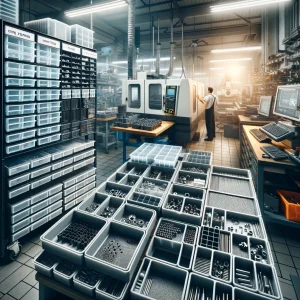Chapter 5: Industries Using Thread Mills
Thread mills are invaluable tools applied across many critical industries. Their unique capabilities make them integral for aerospace, medical, automotive, oil and gas, and other sectors. This chapter explores common applications in key markets utilizing thread milling.
Aerospace
The aerospace industry relies heavily on threaded fasteners and interconnected components. Thread mills enable meeting the high precision and quality demands. Common applications include:
- Engine blocks and components
- Airframe structural fasteners
- Hydraulic fittings and connectors
- Landing gear assemblies
- Rocket motor casings
- Turbine housings
Thread mills machine tough alloys like titanium and nickel-based super alloys with reliability and efficiency. They produce certified threads to print in small runs or high production volumes.
Medical and Dental
Thread mills accurately generate tiny, intricate threads on pins, bone screws, implants and components with no deformation:
- Orthopedic screws, plates, and instruments
- Dental abutments and implants
- Surgical tool handles and collets
- Laparoscopic device components
- Pacemakers and prosthetics
- Catheters and cannulas
- Tiny biopsy forceps
They provide corrosion resistance and biocompatibility in materials approved for medical use like titanium, stainless steel and cobalt chrome.
Automotive
From engines and powertrains to chassis and interiors, vehicles contain thousands of threaded joints. Thread mills efficiently produce robust, reliable threads including:
- Cylinder heads and engine blocks
- Fuel injector bodies
- Steering components
- Wheels, axles and drivelines
- Transmission cases and gears
- Brake assemblies
- HVAC components
- Interior trims and hardware
They handle high strength steels, aluminum alloys, cast iron and more. Indexable thread mills optimize production economics.
Oil and Gas Extraction
Thread mills generate leak-proof connections on drilling equipment and components operating in hazardous environments:
- Segmented oil well piping
- Valves, pumps and blowout preventers
- Drill heads, collars and tool joints
- Wellhead christmas trees and valves
- Cutting toolholders
- High pressure fittings and flanges
Durable carbide tooling holds up to prolonged heavy roughing in exotic alloys and high chrome steels.
Electrical and Electronics
From large generator stators to micro electronics, threads provide precision mated assemblies:
- Motor and generator end caps
- Electrical busbars
- Battery terminals and contacts
- Circuit boards
- Sensor bodies
- Semiconductor casings
- Microscopic component interfaces
Thread mills offer versatility from massive threads to micro-scale forms needed in electronics manufacturing.
And Many More
Nearly every industry has threaded assemblies requiring precision machining. More examples include:
- Optics – camera lens barrels, scopes, mirrors
- Semiconductor fabrication equipment
- Packaging – bottle caps, valves, dispensers
- Heavy equipment – gears, shafts, cylinders
- Appliances – valves, fittings, mounts
- Furniture – legs, mounts, joints
- Consumer products – razors, sporting goods
Thread mills solve diverse threading challenges across all markets.
Conclusion
Thread mills provide unique capabilities to produce high precision internal and external threads to exacting requirements across a vast array of applications and industries.
Mastering thread mill selection, operational techniques, and programming lays the foundation for getting the most out of this important tooling. Applying the proper practices and knowledge equips you to machine threads efficiently, safely and accurately.
Whether producing miniature threads in medical implants, critical fittings for aircraft, or fasteners for mass production, thread mills facilitate quality, repeatable threading. Continued advancement in tooling materials and coatings further improve performance.
By leveraging the specialized attributes of thread mills, manufacturers in every industry can tackle their most challenging threading needs. Thread milling will only continue growing as an indispensable threading process.



